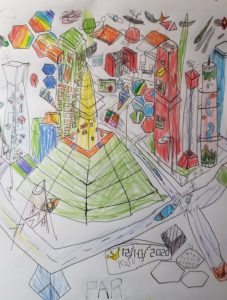
Archives
We Are All Equal
We are equal, we are family
Let’s stand together and face the cold world it truly is.
We are in a bad situation:
Jail, slavery, and death.No one deserves to serve a master
No one deserves to be a slave
No one deserves to be killed
No one deserves to be bought or owned.
Instead of looting, killing, and rioting…
let’s heal, nourish, and care for each other in these difficult times.
There are many problem makers and problem solvers in the world.
Let’s stop the problem makers that are killing minorities
and become problem solvers.
There was and still is violence.
Let’s unify and keep the world organized. Let’s not make and live in pain.
We must become peace, not violence.
Our problem is racial discrimination.
Stop killing people and be peaceful.
Let’s be equal.
No one should be killed because of the color of their skin
whether it’s chocolate, white, lite, or candy.
WE ARE EQUAL. No discrimination shall be allowed anymore! WE ARE EQUAL. No discrimination shall be allowed anymore!
Diary of a Quarantiner
Quarantine, ugh.
5/25/20
The dissatisfaction of staring at your ceiling all day, of missing family, and distance learning. The trauma of a day’s journey from my bed to my computer and back, the tiring of the things I used to love, the sense of being grounded for my safety. I think I’ll be here forever.
5/26/20
Well..I hope not. Because the news and these four walls are starting to make me psycho.
5/27/20
Hmm. I wonder what Cardi B and the Kardashians are doing right now. Are they suffering from claustrophobia? Do they even need a stimulus check? They probably get it first. I wonder if America’s government is the Matrix. Donald Trump… more like Agent Smith with Congress as the other agents, lol.
5/28/20
The coronavirus has ruined my life this year. As a child, Ramadan and Eid were the best moments of a Muslims child’s life. Meeting up with my Muslim friends on the playground after prayer, eating dates and Arab food was the best thing we would do all year. But this year, we couldn’t do it because we had to perform “social distancing.”
5/29/20
I miss the beautiful sights outside. I’ve learned what I’ve been missing out on. Because now I only see these four walls of depression, of the memories and regrets of the things I wish I could forget. I need to get away from this sadness, well music kinda helps I guess.
5/30/20
I constantly scare myself into thinking I have the illness, forgetting I’ve always had shortness of breath on the regular, from just walking up the steps. I now get scared like others whenever someone sneezes or coughs, even on TV.
5/31/20
There have been many “rumors,” but no one knows if they’re true or not. But I’ll tell you what I’m going to do. I’m going to stay home, stay claustrophobic, and stay bored, because this will be all over soon. Like Kimmy Schmidt from Netflix says, “just take it ten seconds at a time.”
Letter From The Editor

Letter from the Editor
It’s been quite an eventful year! Who knew we’d be releasing yet another fantastic issue virtually from the comfort of our homes? It’s sad to think that not long ago, the team and I would meet together, once per week, at the haven of Mighty Writers West. Despite the challenges of editing this issue remotely, similar to our last issue, the transition has gone smoothly, and I’m happy to say that the safe space that Mighty Writers encompasses has made a positively impactful adaption to our virtual setting.
Since September 2020, the team and I have been hard at work on this pandemic issue. This issue, for me, has been the most unique and bizarre than any other we’ve worked on. We had to persevere, seeking out artists and writers who’ve yet to be discovered, as well as working with students who already submitted through our platform. The team and I value each submitter near and dear to our hearts. If it weren’t for them, we wouldn’t have had an issue this year. For that, again, I am so grateful for our team of editors and group of now published student writers and artists.
Sadly, this is the last partnership issue I’ll be working on with Mighty Writers and Philadelphia Stories as I head off to college in the Fall. I’ve been working with both organizations for three years, which has been such an incredible and memorable experience. Having the opportunity to read the adventures and impressive narratives students submitted is heartwarming and inspiring. I look forward to continuing to read the imaginative works of students who seek to be heard through Mighty Writers programs and Philadelphia Stories magazine, to become artists, writers, wordsmiths, and changemakers.
I want to thank Christine Weiser of Philadelphia Stories for recognizing and offering me this incredible opportunity, for inspiring me to become a better writer and leader. I also want to thank Christina Rissell of Mighty Writers for giving me helpful guidance and advice on how to run a team of fantastic, hardworking editors who brought joy to a hard and daunting period of our lives.
Enjoy the issue!
Eric-Ross McLaren, Lead Editor
Philadelphia Stories Junior
(Online Bonus) REVIEW: Kirwyn Sutherland’s Jump Ship
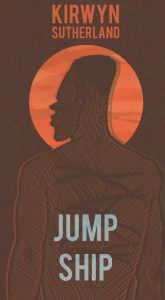
Some of the feelings within a Black life cannot be easily expressed; they contradict each other. Sometimes a person wants revenge against the oppressing majority, and other times, they seek assimilation. Despite the difficulty of translation, Kirwyn Sutherland’s Jump Ship illustrates the triumphs and torment of Black people in America.
Sutherland is a poet based in Philadelphia. He has published two chapbooks, X: A Mixtape and X: A Mixtape Remastered, has written book reviews for WusGood magazine, and has poetry published by Tobeco Literary Arts Journal, Drunkinamidnightchoir, APIARY, and Public Pool. Jump Ship’s illustrations are by visual artist and DJ Oluwafemi.
Jump Ship reveals the mental conversations Black people have with themselves about difficult subjects. The poem, “The Email Said” shows the hidden frustration Black people have when forced to code-switch. “Assimilation” details the mind and the fixed smile of a man who tries to conform with racist coworkers. “Taunts to the Klan” is a proclamation of pride and glee to spite racists.
Like a mind racing, Sutherland’s poems read quickly. He does this by using slash marks in some poems and all caps in others. “The Email Said” uses repetition to create speed.
talking to the wall about
what you would have said
to the ‘next person
who spoke so well
of your “speak so well”’ (16-17)
In “Assimilation,” Sutherland creates speed with imagery:
When I heard my co-workers say nigger
It almost knocked the whiteness
out of me but I caught it with my
fist and prayed whiteness wouldn’t confuse
the grabbing for a power move (13-15)
“Assimilation” is also notable for its references to pop culture: an epigraph says it is inspired by Sarge from A Soldier’s Story. Another poem in this collection that talks about conformity, “Uncle Tom’s Redux,” calls out Kanye West, Steve Harvey, and others for selling out their Black pride. The references in Jump Ship make it timely and relatable.
“Taunts to the Klan” uses speed similarly to “Assimilation”; both use description to create intense situations. But thematically, the poems conflict. The narrator of “Taunts to the Klan” can spot a closet or a proud racist within seconds, but the narrator of “Assimilation” wishes to fit in with the racists around him, so much so that he maligns his Black co-worker. Black pride and self-doubt, ideas like these are explored in Jump Ship.
Some poems use slash marks as well as line breaks to affect pacing; others use capitalization to affect the volume and intensity of specific words or phrases. Most of the poems manipulate their speed in some way, leading to a reader feeling impassioned. These poems are not contemplative gazes at nature; they’re a door kicked off its hinges. They’re shouts of pride and wails of agony from centuries of torment.
Writing for Social Justice: At Your Mother’s Knee
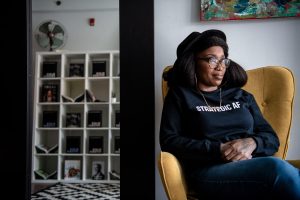
The idea of instituting Governments is to secure people’s rights to life, liberty, and property. When John Locke stole this nugget of ancient Egyptian wisdom from the goddess Maat, I wonder if he had any idea folks like Thomas Jefferson would bastardize the wisdom and completely change the language, replacing property with pursuit of happiness.
Today, we see the consequences of this theft in American society. The colonialist mindset of manifest destiny was created without the contextual principles of truth, balance, order, harmony, law, morality, and justice that Maat represented thousands and thousands of years before this country’s inception.
If America had been built on these principles, the humans, the animals, the oceans, and the airs would yield better results for all life forms. But alas, Maat’s bastard child, the United States, was birthed without a legitimate connection to its mother. Stealing from her while trying to mimic her at the same time.
No respect for the true mother of American principles has been shown. This is evidenced as women who built this country were shamed, granted no property rights, and barred from the pursuit of happiness. And of course, out of pure hate, the founders captured Black women, and not only denied them property or a pursuit of happiness, but also inflicted inexplicable atrocities on them.
This sordid, inequitable history has left many Black women behind their peers when it comes to ownership in this country. And by ownership, I really mean guardianship, because as Maat will tell you, no one “owns owns” this land.
So how do we begin to reckon with this wretched history and restore the order? Well, look around and see that I, like so many Black women business owners in Philadelphia, are running businesses out of buildings and off of land that we have very little rights to or ownership over.
This modern form of sharecropping, working the land that someone else benefits from, limits our ability to leave the legitimate legacy of our businesses to our lineage and poses a serious impediment to our lives, our liberties, and our pursuits of happiness/property.
For the new year, I wish more folks, especially Black women in Philadelphia, and around the world, owned (not leased or borrowed) our own land and maintained complete and total autonomy over the direction of our futures on this land. This is the only way to begin to rectify the bastardization of Maat’s ancient wisdom. This is the only way to begin to repair the damage inflicted on us through forced labor in a measurable, sustainable way—because simply posting Black Lives Matter on Twitter or kneeling at a protest or reading antiracist literature is not enough.
Speaking of reading antiracist literature, my job as the shopkeeper at Harriett’s Bookshop is to curate and recommend books. This month I am recommending Ida B. The Queen: The Extraordinary Life and Legacy of Ida B. Wells which will be released on January 21st. It examines the life of Ida B. Wells—the mother, the writer, the advocate, the activist. Ida B. Wells exemplifies a crusader intent on restoring order and enlisting the principles of Maat even in the face of the lynching of her friends, the destruction of her newspaper, and the insults on her name. In her day, Ida B. Wells galvanized small civic groups across the globe to work in tiny cells on measurable community actions. Think big tree, small axe.
Consider, not only reading Ida B. The Queen, but also using her great granddaughter Michelle Duster’s text as a catalyst for starting your own small civic group that moves into action on the topic of life, liberty, and property. Because only the people can restore the order. It is also time to start partnering with like-minded folks and securing guardianship over land in ways that align with principle over profit. And while I am asserting large institutions should listen to this conversation and take action by offering land and resources to the people, I assure you this is going to happen either way. Because as the Great Mother Maat reminds us, balance is necessary and life, liberty, and property are a birthright. Ase.
For the last 10 years, Jeannine Cook has worked as a trusted writer for several startups, corporations, non-profits, and influencers. In addition to a holding a master’s degree from The University of the Arts, Jeannine is a Leeway Art & Transformation Grantee and a winner of the South Philly Review Difference Maker Award. Jeannine’s work has been recognized by several news outlets including Vogue Magazine, INC, MSNBC, The Strategist, and the Washington Post. She recently returned from Nairobi, Kenya facilitating social justice creative writing with youth from 15 countries around the world. She writes about the complex intersections of motherhood, activism, and community. Her pieces are featured in several publications including the Philadelphia Inquirer, Root Quarterly, Printworks, and midnight & indigo. She is the proud new owner of Harriett’s Bookshop in the Fishtown section of Philadelphia.
Pond: a synonym for hope
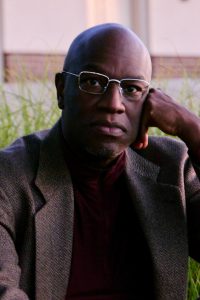
To read “Pond: a synonym for hope,” click HERE.
elijah b. pringle, III has facilitated workshops on writing. Published nationally and internationally, he is nominated for a “Best In Net 2020.” Elijah has been the MC/Host for Panoramic Poetry, Moonstone Art Center, ToHo Journal and PhillyCAM’s “Who Do You Love”. He has been a mentor to many and a student of everyone.
Washing Stockings

Around Midnight
the same fashion Daddy’s arms would rest
on the torn edge of his seldom used easy chair
which sat lonely in a corner trying to be unseen
Mom’s arms would rest on the lip of the basin
bending over a sink made white with Comex
water would dance between strong sturdy hands
as she scrubbed vigorously ‘puff of smoke’ stockin’s
to move the dirt and dust collected from the week
when she would fix the kids for school and please her man
after the day’s work for money to close the gap
between can’t afford and thrift shop bargains
second handed stuff that was given another chance
the ritual of familiar made us all comfortable
we knew it was Saturday soon to be Sunday
Mommy’s steps were bunions and corns then
the bottom of her feet black from the walks
barefooted because her shoes were too tight
and so was money and I needed new sneakers
just so the white kids wouldn’t laugh at me
or we needed something, always something
but Ivory soap lathers up extremely well
when rubbed against used nylon stockings
about to be glory bound in eight hours that’s
after they had dried in front of the heat vent
even in summer the ritual meant everything
elijah b. pringle, III has facilitated workshops on writing. Published nationally and internationally, he is nominated for a “Best In Net 2020.” Elijah has been the MC/Host for Panoramic Poetry, Moonstone Art Center, ToHo Journal and PhillyCAM’s “Who Do You Love.” He has been a mentor to many and a student of everyone.
Black Diamonds and Pearls
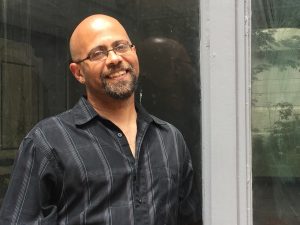
He tells me of days when even dreams can’t wriggle free.
I see him struggle to hold
the laughing child
once alive inside him,
watch him strain to remember
how beautiful it can feel to be gentle.
There are walls and there are walls,
and now I only see him through gun-proof double-thick glass,
in this place where chained hearts steadily drip
onto already stained concrete floors,
and I don’t waste time telling him
I miss him. I find ways to smile,
even manage to drag an actual laugh through his
ragged lips, and his fingers
aren’t too torn
when they line up mirror-image of mine. He worries, you see,
that I will let go of even this, and I can offer no reassurance
for that same fear has already seized
my own broken heart.
As a mixed-race child of the 80s, Martin Wiley grew up confronting and embracing a world that was as jumbled and confused as he was. His current work attempts to examine what it was to search for manhood in that time and place. For the past few years he had labeled himself a “recovering poet,” but his children’s love of words has dragged him, mostly happily, off the wagon. After receiving his MFA from Rutgers-Camden, he remained in Philadelphia, working at Project HOME, being a dad and husband, and finding time, when possible, to write.
Tea Scars

To read “Tea Scars,” click HERE.
Mariah Ghant (she/her) is a Black woman artist based out of Philly. An alumnus of Vassar College, she studied Drama and English focusing on Acting and Poetry Writing. Mariah’s work has been featured in three print publications with Z Publishing, as well as online with Distance Yearning, Lucky Jefferson, MixedMag, and Passengers Journal. Forever fantasizing on the phenomenal, Mariah’s writing explores relationships, identity, and the cosmos. Visit her poetry Instagram @mariah.g.poetry or check out her artist website, mariahghant.com.